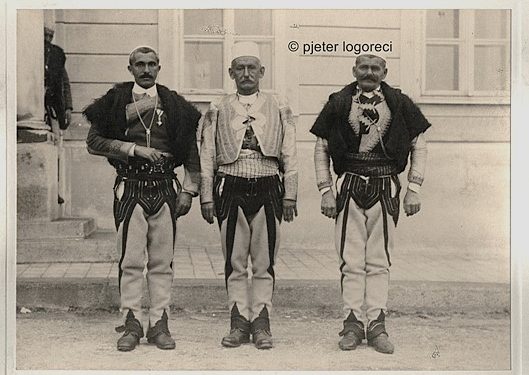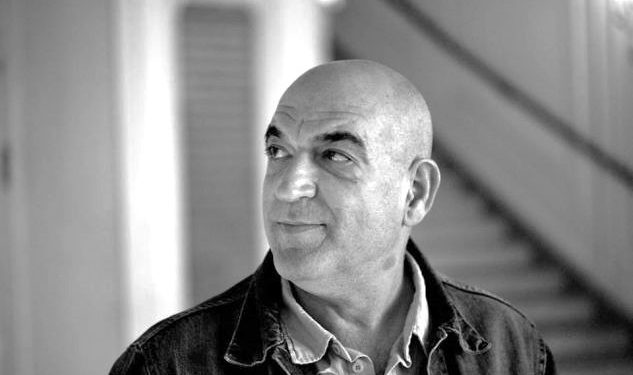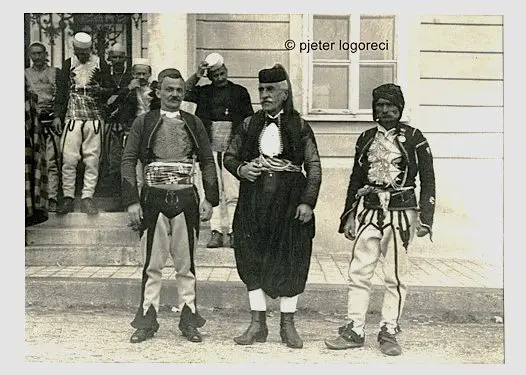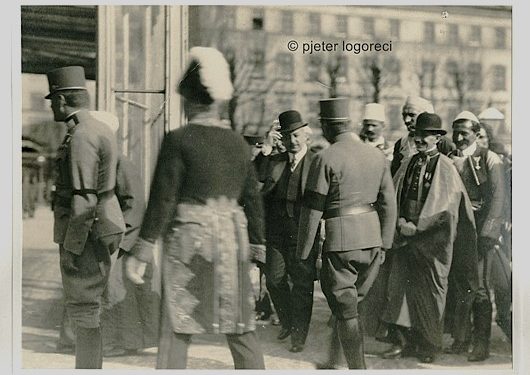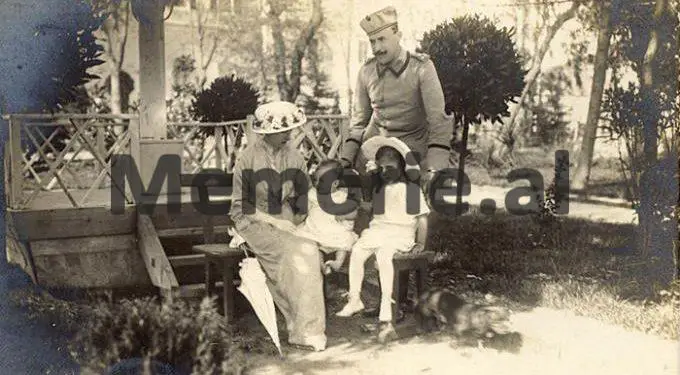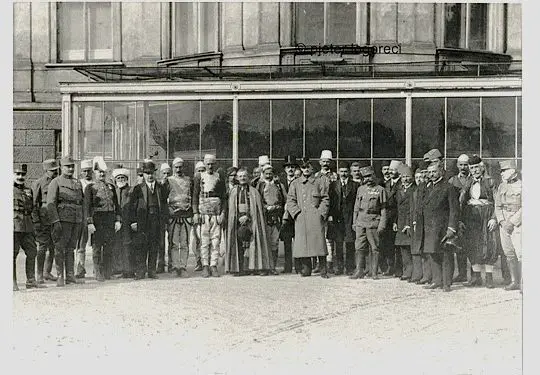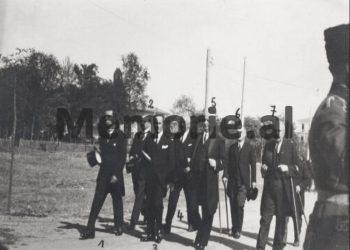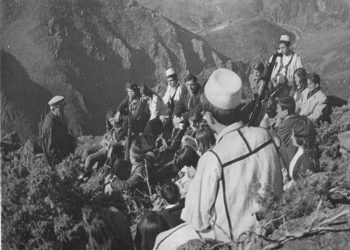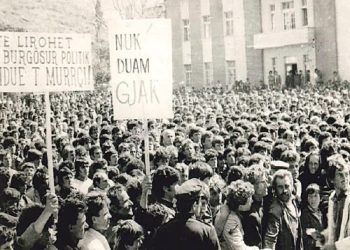By Pjetër Logoreci
Memorie.al / In mid-April 1917, a delegation of 34 Albanians, invited by the commander of the Austrian military forces located in the Albanian territories, General Ignaz Freiherr Trollmann, visited the Austrian imperial capital, Vienna. The delegation, which arrived in Austria on April 17, 1917, was greeted at the central railway station by many imperial military and diplomatic personalities, such as Generals Trollmann and Myrdacz, General Ritter von Gross, Consul Rudnay, as well as the well-known imperial journalist, Leo Freundlich (who wrote and documented detailed moments of the Albanian delegation’s visit throughout the period, which are my references in this article). The purpose of the Albanian representatives’ visit was a courtesy meeting with the new Emperor Karl, as well as to pay homage at the grave of Emperor Franz Josef.
The delegation, composed of the most prominent men (leaders) from all Albanian territories, made a great impression on the city. The noble Albanian highlander leaders, dressed in their colorful, national costumes embroidered with gold thread, were watched with attention by the Viennese during their numerous visits to the most prominent sights of the city. People were surprised by the proud and manly appearance of these tall men with heroic mustaches, who were known until then only through the writings or works published by Austrian Albanologist scholars.
Curious crowds filled the sidewalks when the delegation passed by in luxury cars, characteristic Viennese carriages, or in a special tram wagon, to enjoy the beauties of the most renowned European city. The group was accompanied by professors Gjergj Pekmezi and Kolë Rrota, who lived and worked in Vienna.
In the archives of the Ministry of Foreign Affairs of the Austro-Hungarian Empire era, confidential information can be found, which was sent (in cipher) by the Austrian Consul in Albania, Kral, to the Foreign Minister Count Ottokar Czernin, in Vienna. The documents are lists containing the names of the invited guests, and for each guest, there is a short biographical description made by the Austrian consulates in Albania. The first document was sent from Shkodra and is dated April 10, 1917. The lists are formulated according to the division of districts or cities:
Bezirku I-rë – Shkodra District
Musa Efendi Juka, Mayor of Shkodra, comes from a distinguished Shkodran family. During the Turkish period, he was a high finance official in the Vilayet of Shkodra. After the occupation of the city by the Montenegrins (1913), he left for Constantinople, but later returned to Shkodra, where he greatly assisted in the spread of the Young Turk policy. For this reason, after the second occupation of the city by the Montenegrins (1915), he was held in prison for one month. He has been decorated as a “Knight of the Order” of Franz Josef.
Kol Ujka, merchant (he replaced Gjon Çoba, who announced his non-participation in the group due to health reasons). Gjon Çoba comes from a well-known Catholic Shkodran family. His father was the translator for the Austrian General Consulate in Shkodra for 40 years, a job he performed with honor. He maintained close ties with us, and for this, he was interned by the Montenegrins in Podgorica in 1915. He is, like his father, a major merchant.
Hasan Efendi Bekteshi, comes from an old Shkodran family. He is a major merchant. His grandfather was “Kuluktishibash,” Post Commander of Shkodra, during the time of Vezir Mustafa Pasha; his father was “Bylykbash,” the representative of the highlands in Shkodra. Hasan Efendi is politically on our side. In the years 1914–1915, he supported the Young Turk policy that acted against Essad Pasha, which is why he was captured and imprisoned by the Montenegrins for one month.
Vat Marashi, Bajraktar of Shkreli. Mudir (administrator) of Pulaj, during the time of the Turks and the international powers. He had very good relations with the Turkish authorities, but following the humiliating unilateral stance of the Turks, he sided with the highlanders. During the first occupation by the Montenegrins, he was interned as a supporter of the Turks. He is a genuine politician and a talented orator.
Gjelosh Gjoka, Vojvoda of Kastrati, our sincere collaborator. He was in the service of Prince Wied in Durrës, and after the Prince’s departure, he returned to Kastrati. When the Montenegrin armies crossed the Albanian border, he left for Shkodra (1915). All his property was plundered and burned in his absence. He is a recipient of the “Golden Cross” for merit.
For Lezha:
Mano Bey Mehmed Bey, comes from a very old and prominent family from Lezha. His father, grandfather, as well as himself, were Mudirs of the Lezha highlanders. His family is a large landowner.
Ded Çoku from Bregu i Matit, comes from the Klementi (Nikci) tribe. He was very wealthy before, but lost part of his wealth (land) due to his rebellion against the Ottoman government, the war against the Shijak rebels, and against Essad Pasha. He is an ardent Albanian nationalist and an open supporter of Austro-Hungary. He fought on our side against common enemies. He is a recipient of the “Golden Cross” for special merits.
Bezirku III – For Puka and Mirdita
Kapitan Nue Gjoni, brother of the Kapidan of Mirdita, Marka Gjoni, cousin of Prenk Bib Doda. Descendant of the distinguished Gjon Markaj family from Oroshi. Supporter of the Austro-Hungarian Monarchy. He took part in the fighting against the Shijak rebels, against the Serbs, and Essad Pasha.
Zef Ndoci, Vojvoda of Spaç (son of Ndoc Ndreca, commander of Mirdita during the Turkish period). He was a teacher at the Spaç parish school for many years. He took an active part in the resistance against the Turks, in the war against the Serbs, and against Esad Pasha, to whom he caused great damage. He is an Albanian nationalist and a sympathizer of the Austro-Hungarian Monarchy. Recipient of the “Golden Cross” for special merits.
Zejnel Aga Ibalja, Vojvoda of Iballa, from a very prominent and wealthy family. He fought alongside Bajram Bey Curri against the Serbs and Essad Pasha, on the side of Prince Wied. He is known for his friendship with us.
Bezirku IV
Muharrem Pengili from Kruja, formerly Mufti, now Naib-Mufti in Kruja. A very well-known and very brave Mohammedan cleric.
Ahmed Bey from Mati, representative and heir of the dominant Mat tribe, Zogolli, who inherited the title of Kaymakam from the Turkish regime. He played an important role in the autonomy of Albania. He fought against the Serbs and was an opponent of Esad Pasha. He placed 4000 – 5000 volunteer fighters at the disposal of our army when we entered Albania; they fought on the front near Vjosa. He has been honored with the highest order of the “Kaiser Franz Josef.”
Bezirku V – Tirana District
Mussa Maçi, formerly Mayor, a prominent family, merchant, and Tirana citizen with great influence in Tirana.
Xhelal Bey, from the Toptani family, cousin but opponent of Essad Pasha. A great landowner. A wise politician and man.
For Durrës
Izzeddin Beshiri, formerly Sub-Prefect and now Mayor of Durrës. Young in age, but very intelligent and willing to help everywhere. Comes from a good family. A zealous collaborator of our administration since the beginning of the occupation. He holds the “Golden Cross” with a wreath for special merits.
Monsignor Nikollë Kaçorri, Protonotary Apostolic, parish priest of Durrës, nationalist, and supporter of the Austro-Hungarian Monarchy. A devoted priest. A man of special intelligence and personality.
For Kavaja
Kassim Bey, from a distinguished family. Very wealthy, Mayor of Kavaja.
Shehziver Bey, nephew of Eliaz Pasha from Dibra – Ohrid. Nephew of the very well-known and respected Aqif Pasha from Central Albania. He assisted, with volunteers, during the arrival of our and the Bulgarian troops. In the first six months of the previous year, he was Prefect of Elbasan. He is decorated as a “Knight of Franz Josef.”
For Elbasan
Lef Nossi, of the Orthodox faith, from a wealthy Christian merchant family. Despite the great danger during the Turkish government, he organized the people, mostly the Orthodox residents of Elbasan, for an Albanian national movement. He was Minister of Post and Telegraph in Ismail Qemal Bey’s government and Secretary-General in the same ministry during Wied’s time.
Irfan Bey from Elbasan, nephew of Aqif Pasha.
For Berat and Skrapar
Sami Bey Vrioni, member of the old Vrioni family, who are the largest landowners and wealthy magnates in the Devoll area. He is the son-in-law of Essad Toptani. He was the Court Administrator (Hofmarschall) of Prince Wied.
Mehmed Essad, a very distinguished Mohammedan cleric. He was formerly the Mufti of Berat, now director of the Mohammedan seminary there.
Dhimiter Lavda, of the Greek Orthodox faith, a distinguished man and well-known merchant.
For Lushnja
Ahmed Bey Resuli, comes from an old and distinguished family, very wealthy.
Emin Vokopola, a man with great authority, very well-known and wealthy.
For Fier
Kahreman Bey Vrioni, close cousin of Sami Bey Vrioni, wealthy and a nationalist. He fought as an officer against the rebels and Essad Toptani. He achieved great successes in this war by leading our troops. He is trusted by us and is a “Knight of the Order” of Franz Josef.
Bezirku VI – Zhuri – Peshkopija
Elez Jussuf, is a very well-known man with authority in the Drin areas from Dibra. He is trusted by us. He resisted several groups in Dibra, propagating the Geg influence. He openly opposed the propaganda of Essad Toptani’s party. He fought at the head of volunteers against the Serbs until their withdrawal. He placed himself at the service of our forces and has won the High Order as an “Officer of Franz Josef” for war merits.
Salih Spahija from Luma, is the representative of the most important family in Luma. He fought against the Serbs and is a sub-prefect in our administration. He has a lot of influence.
For Krasniqi
Hysni Bey Curri, nephew of Bajram Bey Curri. During the reforms in Macedonia (1914), together with Bajram Curri, he was a follower of Hysni Hilmi Pasha, the inspector of the reform commission. At the time of the Kosovo revolution (1910), together with Bajram Curri, he took part in the Albanian resistance against the Turkish government. At the same time, he participated in every movement and resistance against the Slavs, as well as in the fighting of Prince Wied in Durrës.
Sali Mani Bunjaj, is a member of a well-known and wealthy family. He has always been and remains a follower of Bajram Curri.
Hasan Bey Prishtina, is one of the most prominent, nationalist, and influential men in all North-Eastern Albanian-speaking areas. He was a minister in Prince Wied’s government.
The delegation, accompanied by General Trollmann, visited many art, culture, and history sites of the empire. The first visit was to the Imperial Treasury Chamber, and from there to the Art Museum, where they had the opportunity to see and examine closely the arms and helmet of our national hero Gjergj Kastrioti, which is located in the arms collection room. Another important visit was to the catacombs of the Capuchin Church where the graves of the members of the imperial family and the sarcophagus of Kaiser Franz Josef, who had died a few months earlier (November 21, 1916), are located. Here, a wreath was placed, and speeches of thanks were delivered by Gjergj Pekmezi and Hasan Prishtina, in honor of the deceased emperor.
On other days, visits were made possible to the Military Museum, the magnificent St. Stephen’s Cathedral in the city center, and subsequently, an audience was held where our delegation was received by Emperor Karl and the Empress for about 45 minutes. On behalf of the Albanians, Mr. Xhelal Toptani gifted the three-year-old princess a dress embroidered with gold thread, a hand-made item by Albanian mothers. Following the meeting with the Emperor, the Albanians, riding in 10 military vehicles, visited the Vienna City Hall, where they were received with honors by the mayor, Dr. Weiskirchner.
According to the visit program, the delegation also enjoyed the beauty of the “dancing of the purebred horses” at the Spanish Riding School of the Imperial Court. They were then introduced to the unparalleled and unique collections of the Museum of Natural History, which the Emperor had built to satisfy his senses and show the world the power and wealth of the empire. The most interesting thing on the third day of their arrival was the group’s visit to the famous Vienna Opera, where “FIDELIO” was performed that night. For many members of the delegation, this was a novelty they had not had the opportunity to enjoy before.
On April 20, the Albanians were received at the Ministry of Defense (War), where they exchanged mutual thanks and praise with the minister. The delegation then visited Schönbrunn Palace, with the beauties surrounding it. In the late hours of the night, a part of the delegation was scheduled to depart from Vienna towards the homeland, and a farewell party was organized for them by the authorities.
The weekly program also included a meeting with the Albanian children who were schooled in Vienna and lived in a special dormitory just for them, in Krottenthalergasse. What made an impression at the magnificent farewell party was the speech held by the commander of the Austrian forces in Albania, General Trollmann, who greeted the Albanian nobles for the great assistance given to the organization of aid, the army, and volunteers. At the end of his speech, he shouted in the Albanian language: “Long Live Albania!”
After him, Monsignor Nikollë Kaçorri took the floor, saying that the Albanians were more than satisfied with the reception given in this city, wonderful in beauty and culture. On behalf of all the delegates, he thanked the Emperor and the other state and city authorities for the warm reception they gave them.
Finally, Monsignor Kaçorri, with warm words, thanked and wished General Trollmann all the best for the sympathy he nourished for the Albanian people, a wish that was cheered by all the attending members of the delegation. The Albanian delegation departed for their homeland on April 23, 1917.
Note: Monsignor Kaçorri died about a month later in Vienna (May 29, 1917)…/ Memorie.al




